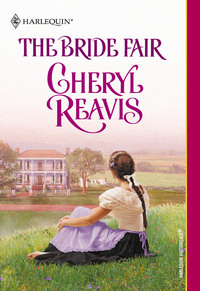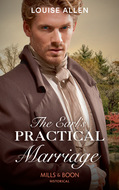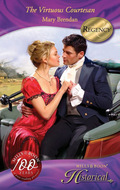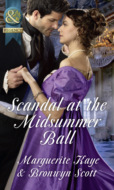Kitap dosya olarak indirilemez ancak uygulamamız üzerinden veya online olarak web sitemizden okunabilir.
Kitabı oku: «The Bride Fair», sayfa 4
Maria didn’t recall asking for an audience. It was bad enough that he had the power to dictate her comings and goings, and even worse to have to remain in a house full of Yankee soldiers.
She gave a quiet sigh. She had to see about Suzanne, and she had no easy way to get there. She had no food to take her if she could manage to make the trip, unless she pilfered Colonel Woodard’s pantry, which she couldn’t do—key or no key—with Perkins so close at hand.
She was essentially trapped with nowhere to go. If she tried to work in the garden, she would have an unwanted audience, and inside, she might encounter De Graff again—or the colonel.
“Maybe you should join your father,” Perkins suggested, as if she’d spoken out loud.
“No,” she said. There was too much work to be done. If she didn’t get to the hoeing, the morning glories would run rampant in the corn and beans, thanks to yesterday’s rain. The kitchen and the hall—and now the dining-room floors had to be scrubbed free of muddy boot prints. The ironing she should have done yesterday instead of going to the railroad station still sat in the basket in the corner. She had two more meals to prepare. She needed to start a fire in the stove in the summer kitchen to cook the dried butter beans she had soaking. If she didn’t, they’d never be done in time. Her father hated butter beans, but it was either that or accept the colonel’s bounty, and she didn’t want to touch his food, if she could help it.
And she was tired.
“They won’t bother you, miss,” Perkins said.
“What?” she asked, because she had been too busy feeling sorry for herself to remember that Perkins was still close by.
“The men. The colonel has given them all strict orders not to accost you on any account—regardless of their rank.”
She looked at him, not at all certain that she believed him.
“I think I will go see my father,” she said. She went quickly up the back stairs and just as quickly changed her mind again. Her father was still on the upstairs porch—but he was deep in conversation with Colonel Woodard.
Her alternate plan was to take herself to the summer kitchen. She would be essentially out of sight of the soldiers in the yard and not apt to run into any of the ones who still wandered over the house. She took the basket of ironing with her, giving thanks as she went that the Markhams had once been well off enough to have this alternate place to cook and work in hot weather. There were a number of windows she could raise to catch whatever breeze might at hand. The important thing was that she would be alone there. She could work and she could think—or not think, as she chose.
It took her only a short while to get the cast-iron stove going and the dampers adjusted and the butter beans rinsed and in the cook pot. She put two sets of irons on the stove to heat, and then dampened the clothes with water and rolled them tightly and put them into a pillowslip.
She had to go back into the house once because she’d forgotten the old sheet she used to pad the table when she ironed. Her stomach had finally settled, and she went down into the cellar to get herself an apple. She could hear that the colonel’s staff meeting was in session—and from the sound of it, things were not going well.
All the more reason for her not to tarry, she thought. Her only wish was to stay out of his way. She returned to the summer kitchen and ate the apple—and actually enjoyed it. Perhaps there was something to the lemon juice “cure.”
When the irons were hot enough, she began pressing her damp petticoats and chemises. From now on, when she did the wash, she’d have to find somewhere inside to hang them to dry. She did not want her underpinnings blowing in the breeze for Union soldiers to see.
She kept ironing, kept worrying about how she could get to Suzanne and how she could thwart Colonel Woodard. She could hear the buzz of insects at the open windows and the murmur of the soldiers still working on their pen. She hummed softly to herself to keep her thoughts from going in a direction she wouldn’t be able to endure.
It was so hot. If they hadn’t been in the yard, she would have done the ironing in the shaded walkway between the house and the summer kitchen. After a time she shed her pinafore and rolled up her sleeves. Then she took off her shoes and stockings, savoring the feel of her bare feet against the cool stone floor. Even so, she still had to wet her face and neck with cold water from time to time in order to stand the heat.
At one point, she looked up at a different sound. Colonel Woodard stood in the doorway.
“I’ve spoken to your father,” he said without prelude—something he did often, she was beginning to realize, as if it didn’t matter how he came to a particular point, only that his ultimate demand was met and with total compliance.
She didn’t say anything, partially because she had no idea what direction the conversation was taking and mostly because she was mortified that he would see her bare feet. She bent her knees slightly to make sure her skirts touched the ground.
“Your father agrees that it might not be expedient to allow you to go see about your friend under a pass. You will be escorted at his request.”
“I will speak to my father about it myself,” she said. She wasn’t about to take his word for anything.
“I believe he is resting now—”
“I will speak to him, anyway.”
“Fine,” he said, turning to go. “But put your shoes on.”
She could feel her face grow even hotter, and she stood there, her mortification giving way to absolute indignation. If the iron in her hand hadn’t been so heavy, she would have thrown it at him.
“Hurry it along, Miss Markham,” he said as he walked away. “The Army of the Republic waits for no one.”
She slammed the iron down—only to pick it up again because an arrogant Yankee colonel wasn’t worth a scorched sheet. She slung the iron onto the stovetop with a loud clang. Then she set about getting her shoes and socks and her pinafore back on, muttering under her breath all the while. When she straightened up, two soldiers were looking in the window, both of them grinning from ear to ear.
“Would you be needing anything, miss?” one of them asked innocently.
She needed a loaded pistol, but she didn’t say so. She ignored both of them and walked swiftly back into the house, her head held high.
Colonel Woodard and Perkins stood in the kitchen.
“Sergeant Major Perkins, tell Miss Markham where her father is,” Colonel Woodard said when he saw her.
“Mr. Markham is asleep on the daybed in his sitting room, miss,” Perkins replied dutifully. “He has had a bit to eat, and he has no complaints—except that he is tired and would like to rest now.”
Maria looked from one man to the other. She had every intention of speaking to her father herself.
“I’m leaving now, Miss Markham. You are still concerned about your friend?” the colonel asked when she headed for the back stairs.
She stopped, realizing that he was once again deliberately trying to provoke her. She closed her eyes for a moment in a monumental effort to keep her temper in check. She would not let him win.
“Yes,” she said, turning to look at him. “I am still concerned. I want to go see about her—if you please,” she added, though it nearly killed her to do it.
“Excellent—Perkins, you know what to do.”
“Yes, Sir!” Perkins said, hurrying away.
Maria moved to get her straw hat down from the peg by the back door, then she stood and waited for her instructions from the colonel and tried not to shred the brim.
“This way, Miss Markham,” Colonel Woodard said.
He went ahead of her into the center hallway. A number of Yankee officers stood around, and all of them stared as she passed. The colonel opened the front door for her—in what had to be purely a token gesture of courtesy on his part. No matter how it might appear on the surface, there was nothing civil about the man. But she had no doubt that her father had been fooled or that he had sanctioned her going.
A carriage sat in front of the house—the same one that had brought his belongings yesterday—and the colonel was going to win after all. She was suddenly overcome with consternation at the sight of it. She simply could not bear to be seen in public with this man two days in a row.
He was halfway to the street when he realized she was no longer trailing after him.
“What is it?” he asked, waiting for her to catch up.
She made no attempt to do so.
“I can’t,” she said, trying not to sound as hysterical as she felt. “My father would not want me to be seen about town with you like this.”
“He didn’t seem to mind yesterday when he sent you to the train station,” the colonel said. “That aside, I told you I had spoken with him. He feels that my escorting you personally to see about Mrs. Canfield is an excellent plan. I must go to my office, anyway. You can remain with Mrs. Canfield until I—or Perkins—can fetch you home again. Unless you prefer to stay here in the company of a bunch of…I’m ashamed to say, very poorly disciplined officers, who may or may not adhere to the letter of my direct orders and remember that they are gentlemen by military decree, if nothing else. Your choice, of course.”
“My choice? It is not my choice! You have me in a corner and you know it!”
“Yes,” he said agreeably. “Are you coming along or not?”
She was, and he knew that, too. She picked up her skirts and walked purposefully by him and climbed into the carriage, ignoring Perkins’s outstretched hand. She had already learned from yesterday’s buggy ride that Colonel Woodard would do whatever he pleased, and she moved into the far corner of the seat to keep him from parking himself on her pinafore and skirts.
But he made no attempt to sit beside her. He took the opposite seat instead and watched her closely—which was worse. Maria turned her head to keep him from looking directly into her eyes.
They rode down the shady street in silence. A pack of dogs, unmindful of the curfew, came bounding out from under a house to nip at the horses’ heels for a short distance.
“Your father tells me you and Mrs. Canfield have been friends since you were children,” Colonel Woodard said. “He said you used to name your pets after each other. I was particularly interested to hear that there was once a little red hen named ‘Maria Rose.’”
Maria glanced at him, fully aware that he was trying to annoy her again, but she didn’t say anything.
“I believe he mentioned ‘The Three Musketeers,’” the colonel continued. “But he didn’t say who the third one was.”
Maria made no reply to that, either. She was looking at the houses they rode past. There was someone sitting on nearly every porch, all of them watching, waiting to see what indignity would be inflicted upon them next, and all of them trying to decipher the meaning of Maria Markham’s letting herself be seen in the company of the new Yankee colonel.
Again.
“Have courage, Miss Markham,” he said.
“I have no reason to fear,” she said pointedly, and she might have meant it if they were not nearing the Kinnard house. Acacia Kinnard ran this town—at least when it came to social matters. Her husband was a man of property and influence—money—even in these hard times. And whenever she snubbed another woman, that woman’s social invitations ended.
“Maria!” Mrs. Kinnard called from her second-story porch. “Is the curfew lifted?”
“No, Mrs. Kinnard. I have permission to see about Suzanne Canfield.”
“Indeed,” Mrs. Kinnard said, obviously pleased. “Well done, Maria!”
“Would you like to visit with this lady a bit?” Colonel Woodard asked under his breath.
“Good heaven’s no,” Maria said in alarm. “I must see about Suzanne,” she added. Knowing Acacia Kinnard, she would want Maria to expand on her success and arrange for all the Kinnard family and friends to escape the curfew, as well.
“I do hope the Ladies’ Literary Society will be able to meet soon,” Mrs. Kinnard called as if on cue. “I so miss our readings. I was truly looking forward to hearing about the Scottish chiefs. Do you know when the curfew will be lifted, Maria?”
“No,” Maria answered, in spite of the fact that the question was by no means directed to her.
“Friday, ma’am,” Colonel Woodard said, taking the hint.
“Friday! Are you certain?”
“I am, ma’am. That is, if there are no further…incidents. We will return to the previous rules and curfew—10:00 p.m.”
“Excellent, Maria!” she called, as if Maria had been the one who made the announcement. “I believe the next meeting—Saturday—will be at your house.”
“No, I don’t think—” Maria began.
“Your house, Maria,” Mrs. Kinnard said firmly. “At the usual time. And I trust your father will want to join us. Gentlemen are always welcome.”
Maria tried to hide her exasperation and waved goodbye instead of answering. A Ladies’ Literary Society gathering was the absolute last thing she needed.
“I hope you are satisfied,” she said to the colonel.
“Being helpful always gives one a certain…satisfaction,” he said.
“You were not helpful, sir,” Maria assured him.
“I don’t believe it would be appropriate to continue the stricter curfew so that you don’t have to entertain the literary society.”
“You haven’t met the literary society,” Maria said, glancing in his direction. To her great surprise the man very nearly smiled.
The carriage turned onto Innes Street. There were still people on the porches, but none of them had Mrs. Kinnard’s audacity. Maria wondered idly how the Kinnards’ only daughter, Valentina, was doing in her quest for a Yankee officer husband—and if she knew that her mother had heard enough about the new colonel to have apparently switched quarries.
It would serve Woodard right. Let his new residence be overrun with Acacia Kinnard and her kind.
As they neared the Canfield house, Maria grew more and more anxious, so much so that she barely waited for the carriage to stop before she got out. The front door of the house stood open. She didn’t see the boys or Phelan.
Surely he hasn’t taken them somewhere, she thought. The last thing she wanted was for Colonel Woodard to find that Phelan was still ignoring the curfew.
“Wait, Miss Markham,” Colonel Woodard said. “You forgot this.”
She looked around. Perkins held out a basket. She made no attempt to take it.
“It’s only food, Miss Markham,” the colonel said.
“Phelan Canfield will not accept anything from you.”
“It isn’t from me. It’s from your father.”
“My father can’t afford to hand out food baskets.”
“Perhaps he’s come into some money.”
Maria nearly laughed. She didn’t believe him for an instant, but she came and got the basket—for Suzanne and the boys’ sakes.
“Thank you so much,” she said with as much sarcasm as she dared.
“It’s from your father,” he reminded her.
“For the escort then,” Maria said. “I believe you mean for having put you into a corner.”
“That is precisely what I mean.”
“In that case, you are most welcome, Miss Markham. I will see you later. Perkins!”
The carriage moved off, and Maria stood staring after it.
For Suzanne and the boys, she thought.
For the money.
Chapter Five
“Any trouble?”
Perkins took Max’s question as permission to enter and stepped inside the office. “The town’s pretty quiet, Sir. There’s been a development, though.”
Max looked up from the papers he’d been shuffling in spite of the pain in his hands. “What kind of development?”
“Phelan Canfield, Sir. Drunk and disorderly and breaking the curfew. He’s in jail.”
“Good,” Max said, going back to his papers. “What?” he asked after a moment because Perkins was still standing there.
“Well, Sir, he had his boys with him. I was wondering what you want done with them?”
Max looked at his orderly. He didn’t want anything done with them—but it was clear by the careful expression on Perkins’s face that that was neither here nor there.
“We can’t leave them at the jail, can we, Sir?” Perkins said to prod him along.
“I don’t see an alternative—with their mother not able to take care of them. Miss Markham’s father isn’t well. I don’t think she plans to stay there.”
“I sent word to Miss Markham, Sir—so Mrs. Canfield would know where her husband and the little boys got to. They was both pretty upset about it—”
“The man broke curfew.”
“No, Sir—it ain’t us they was upset with. It’s him—drinking again and what-not.”
Max didn’t ask what the “what-not” entailed. He drew a quiet breath. He had had a long day—but things were in better order now than they had been yesterday. His first act this morning had been to inaugurate a recognizable chain of command, and by doing so, he’d established once and for all that the perpetual party they had all enjoyed under Hatcher’s rule had come to an end.
Max had learned his military lessons from Richard Rush, who had commanded the Pennsylvania Sixth. Rush had been a West Pointer and did not abide military sloppiness of any kind in his subordinates. And neither would Max. He’d given all his officers jobs to do and not enough time to do them in. The results would be…interesting, more telling of the kind of staff he had than a month of observation.
At first impression, they seemed a mixed bunch. Some old veterans who didn’t quite know what to do with themselves in peacetime. Some too young to have participated in the actual war, but still looking for a lark. And some like Major De Graff, who wanted to chase Secessionist women around the furniture—and worse.
His mind went immediately to Maria Markham, the sight of her standing barefoot in the summer kitchen, all hot and sweaty, her sleeves rolled up above her elbows and her dark hair coming undone. She should have been anything but appealing, yet he had waited much longer than he should have before making his presence known. Everything about her at that instant had affected him—even the tune she was humming.
Bushes and Briars.
He recognized it easily. One of the Lancer corporals used to sing it all the time in camp and on the campaigns—Hazeltine had been his name. Benneville Hazeltine, dead now, killed in some skirmish the particulars of which Max could no longer remember. The song was a young girl’s lament about her lover’s long absence and her longing for him—and her fear that her “boldness” might offend him when they finally met again. Corporal Hazeltine had been able to wrap his voice around it in such a way that left the entire regiment unsettled.
Max wondered what Maria Markham knew about that—about boldness. Nothing, he imagined. And it was not his business to teach her. Or even his inclination. He was still incredulous that he had let himself find someone like her fetching. She was pleasing enough, he supposed, or would be, if she were properly turned out—his mother and sister, Kate, would know what to do with her. But she was hardly a beauty, and not to his taste at all. He’d always preferred rosy-cheeked “maids of golden hair.” John Howe used to insist that the popular song, “Aura Lee,” had been written just for him. Whenever he looked at Maria Markham, he didn’t see a desirable woman. He saw something else entirely. It was as if he recognized her—as someone who had suffered deprivations, just as he had. And every time he looked into her eyes, he had the annoying sense that she understood things about their mutual trials and tribulations that he himself did not.
It was suddenly clear to him that he had been too serious for too long. He needed some kind of diversion—the kind he might have enjoyed with John Howe and the rest of the Lancer officers in the old days. A man’s diversion. An all-night game of high-stakes poker, free-flowing, aged whiskey and fine cigars.
And women. Accommodating women who knew their art and were nothing like…
Maria Markham.
She had been afraid of him today. Why? he wondered. True, he was in command of this town—and he’d gone out of his way to annoy her. But he’d done nothing to inspire the look she’d given him when she realized he was standing there in the doorway.
“Sir,” Perkins said, still prompting. “I’m thinking maybe them young’uns ought to be took over to the Markham house when we go. Maybe Miss Markham can just bring them on home with her—if you think you can stand it, that is, Sir.”
Max frowned. Could he stand it? He didn’t actually know. He’d never been in a household with children—at least not since he was one himself. Interrupted sleep wasn’t likely to be a problem. He never slept anyway. He was beginning to understand what Maria Markham meant by being put into a corner. Jail was indeed no place for the little boys, regardless of their father’s past allegiances or his current behavior, and the truth of the matter was that the children would disrupt the Markham household by their presence—or by their absence. He knew Maria Markham well enough to foresee that she wouldn’t rest a moment if she thought they were suffering—and subsequently, neither would he.
“Well, go get them, Perkins,” he said in aggravation.
“Yes, Sir!”
Perkins was gone far too short a time to have made a trip to the jail and return. The boys must have been downstairs someplace. Perkins brought them both up to the office and herded them inside. It was entirely unnecessary in Max’s opinion, but he let it go, because they didn’t seem to be living up to their boisterous reputations at the moment. Both children were obviously tired. And dirty. The smaller of the two had wet himself. Even so, he took one look at Max and toddled forward, raising both little arms in a silent entreaty to be picked up.
“Who is this?” Max asked, painfully lifting him off the floor in spite of his soggy state.
The little boy immediately hid his face in Max’s shoulder, and Max patted him awkwardly on the back with one aching hand.
“He don’t talk to Yankees,” the older one said.
“That would be—” Perkins broke off midsentence to grab the boy by the seat of his britches as he tried to make a run for it out the door.
“Jake,” Perkins concluded when he had the runaway dangling under his arm. “I’m not sure if this one’s got a name,” he said, setting the boy on his feet again. The child stood there, clearly worried. He couldn’t get out, and he didn’t know what to do about Max holding his trusting little brother.
“So which one of the Canfields are you?” Max asked him.
“Phelan Josiah Canfield,” the boy said. “How old are you?”
The boy held up five fingers, then bent down briefly to look under the desk.
“What do they call you—Phelan, like your father?” Max asked when he straightened up again.
“No. Mama and Maria said I had too many names. They just say ‘Joe’ when they want me. You can say ‘Joe,’ I guess—but you can’t say ‘Billy’ if you want Jake. Nobody can say ‘Billy.’”
“Why not?”
“Because it’s Uncle Billy’s name. Jake’s got all of Uncle Billy’s names, but you have to say ‘Jake’ so everybody don’t cry. Mama cries and Grandmother Canfield cries—and Maria, too. I don’t cry. I’m too big to cry. I get called ‘Joe’ and Jake gets called ‘Jake’—’cept sometimes Maria calls us ‘The Js.’”
“Why is that, do you think?” Max said, still trying to make conversation.
“’Cause she loves us,” he said easily, as if he’d already dealt with that question, made the proper inquiries and now had the answer. “Have you got some lots of names?”
“I do—most of them don’t bear repeating.”
“What is your name?” the boy asked, reaching and holding his little brother by the shoe.
“Colonel Maxwell Prieson Woodard,” he said.
“Maria doesn’t love you.”
“No. She doesn’t.”
“She wouldn’t love a Yankee—but I can ask her for a name for you anyway.”
“I think I’ll just make do with the ones I’ve got. Right now it’s time to go.”
“Where?”
“To see your mother.”
“Can I go see Maria?”
“Maria is at your house,” Max said. He stood up with Jake still over his shoulder. The child had gone very heavy suddenly.
“Is this one asleep?” he asked Perkins, turning so the orderly could see.
“Yes, Sir—and then some. I reckon he’s all wore out. Sir, I left the carriage over by the Canfield house—”
“Well, we’ll just have to make do,” Max said. The house was just down the street and around the corner—not at all too far to walk—unless one happened to be very small and as exhausted as his sleeping brother. “Can you ride a horse, Joe?”
“Yes,” Joe said solemnly. “And a elephant.”
“Elephants, too—very good. Get my hat, Perkins.”
“Yes, Sir. You want to trade the hat for that boy, Sir?”
“Yes,” Max said, handing the sleeping Jake over. “Come on, Joe,” he said. The boy immediately latched onto his most painful hand, and he had to switch him to the other one.
“Where are we going?” Joe asked, looking up at him.
“Your house, remember?”
The boy shook his head. “Mama’s sick.”
“I know…but she’s worried about where you are.”
“I hope we get supper,” Joe said.
“Don’t worry—”
Maria’s there, Max almost said. The thought popped into his mind unbidden. He didn’t take time to examine it or the reason for it. He led the boy down the stairs to the street, letting him clump as much as he liked, which was considerable. A private scrambled to attention at the sight of them—a much better response to Max’s appearance than yesterday’s. Of course, the real test would have been if the private had been trying to amuse a town trollop at the time.
The private had a horse ready and waiting—also an improvement.
“Take his head,” Max said to him, because his hands hurt too badly to try to manage the horse and the boy. He placed Joe on the saddle and mounted behind him. “We’re going to go the long way, Perkins,” he said to his sergeant major. “Advise Mrs. Canfield that young Master Canfield will be there directly.”
“Is that me?” Joe asked, trying to turn around enough to see Max’s face.
“It is,” Max said. “Now. Which way shall we ride?”
The shadows were long, but the afternoon was still hot and muggy. Typical for the time of year here, Max knew from his imprisonment. There was enough of a breeze to rustle the tops of the trees along Main Street, but it never seemed to reach the ground. He could hear the sparrows under the eaves of the buildings, and, except for a few soldiers here and there, everything was deserted. At Joe’s direction, Max took the horse first north and then south before he finally turned toward the Canfield house. Maria was standing on the porch, and she walked out to meet them.
“Look at me, Maria!” Joe cried at the sight of her.
“I see you, Joe,” she said, smiling. “What a fine rider you are.”
“Am I fine?” he asked, turning around look at Max.
“Very fine,” Max said. “Shall we show her how fine we look?”
He urged the horse into a small trot down the street and back again, both of them sitting tall to show off for Maria Markham.
At the end of the demonstration, Max handed him down to her and dismounted.
“Perkins told you about—” he began.
“He told me,” she interrupted. “Joe, thank Colonel Woodard for bringing you home,” she said to the boy.
“Thank you,” Joe said dutifully, but at the last moment he abruptly wrapped his arms around Max’s knees in a brief, hard hug.
Max reached down to pat the boy’s head. “Perhaps we can ride again sometime, Joe.”
“His father won’t permit it,” Maria said quietly.
“One never knows—”
“I know,” she said. “If you have a moment, Colonel Woodard, Suzanne would like to speak with you.”
Max looked at her, then at Joe’s upturned face.
“Run inside now, Joe,” he said. He waited until the boy had disappeared into the house before he continued. “If Mrs. Canfield intends to ask for her husband’s release—”
“She does not,” Maria said. “She would merely like to thank you for bringing her children home—and for allowing me to come see about her. It’s the way things are done here,” she added in a not too subtle reference to his claim to want to understand the people he was supposed to govern.
“Very well,” he said. “Lead the way.”
The house was two-story, one of the “shotgun” styles with a long center hall front door to back. As an invading cavalryman, he had ridden more than once right up the front steps of a house like this one, down the hall and out the back—as more of a hell-raising lark than a military necessity.
He could smell something cooking—Joe clearly had no need to worry about getting his supper. As he followed Maria inside, a loud crash sounded toward the rear of the house.
“In there,” Maria said, pointing out a doorway on his left. “Suzanne, this is Colonel Woodard,” she called as she rushed away to investigate.
He stood for a moment, then entered the room. A young, fair-haired woman lay on a daybed by the windows. She had on a faded but clean calico dress and her hair looked as if it had been freshly braided—Maria’s doing, he supposed. She appeared weak and delicate, but pleased to have company, even if it was a Yankee colonel.
“Colonel Woodard,” she said, extending her hand. “Will you come sit by me?”
He did so, pulling up a nearby chair so that she could see him without having to turn. She seemed a little breathless, but she didn’t look feverish. He wondered precisely what her ailment was. That particular detail regarding Suzanne Canfield, Perkins had left out.
“Mrs. Canfield,” he said to acknowledge her, and he placed his hat on his knees, aware that she was looking at him intently.
He waited.
“I never expected to invite a Yankee colonel into my home,” she said finally.
He realized by her slightly mischievous expression that he was about to witness what must have once been Southern belle coquetry at its best. It had been made frail by her illness, and perhaps by her marriage, but it was still in evidence. And quite charming, actually, he decided—if a man didn’t get taken unawares. He wondered if Maria had been mistaken, and Suzanne Canfield was about to petition for her husband’s release, after all.
Ücretsiz ön izlemeyi tamamladınız.








